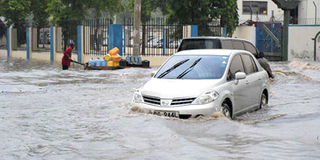Rains may have already failed; the weatherman is not to blame

Motorists wade through floodwater in Mvita, Mombasa County, on October 25, 2018. PHOTO | FILE | NATION MEDIA GROUP
What you need to know:
- Regardless of what the global warming sceptics say, the signs that the climate has been changing gradually and inexorably are all around us.
I am mad at the weatherman. And so, I presume, are many others who rely on the periodical predictions issued by the Meteorological Department until recently when everything went quiet.
A month ago, the Met assured farmers to expect heavy rains from October 15, but a month later, nothing of the sort has happened and the farmers are now in despair.
Indeed, those who planted their seeds a week before that important date are now discovering that the weatherman and the weather were all along working at cross-purposes.
CLIMATE CHANGE
While it is true that the rains started in earnest in some areas, peasant farmers in many others are about to lose all the seeds they had painstakingly stored and sowed as soon as the dark clouds started gathering.
Why the huge — and growing — disconnect between weather forecasts and reality? Could it be that the gizmos used to predict when, where and how much rain to expect are outdated or even obsolete, in which case we should be free to resort to witch doctors and rain makers to tell us when to plant?
Or could it be, as some poor farmer guilelessly told me, that God is angry with Kenyans for stealing from the poor?
No, to me the answer to this last is rather more prosaic. Either the weatherman has all along been relying on guesswork, in which case my departed grandmother would have been a lot more accurate for she used to feel the rains coming “in her bones”, or the dreaded climate change has taken a greater toll on this country than we could ever have imagined.
Regardless of what the global warming sceptics say, the signs that the climate has been changing gradually and inexorably are all around us.
DISASTER
These days, the long rains never fall when they are supposed to, and the short rains are sometimes heavier than they used to be, catching farmers unawares.
Prolonged droughts have become the norm, followed closely by ravaging floods which destroy the livelihoods of those living close to riverbeds and on the plains. It happens practically every year.
The extended period of low temperatures this year — from June to August — is another example. It has never happened before, for the cold spell was always associated with the months of June and July, but this year, it continued until August.
Similarly, the short rains which normally fall in August were unusually heavy this year, extending from May to August, causing heavy flooding especially in Nairobi, Turkana, Samburu, Nyanza and the usual suspect, Western Kenya. These phenomena are not normal.
ACCURACY
As for this “rainy” season, let me hazard a guess as to what is likely to happen in the near future.
When the rain does fall in those areas that have been denied so far, it will be very heavy and very short. This will be a real disaster, for those seedlings that will not have shrivelled by then will be swept away by gushing rain-water.
Yet this is the kind of thing that the gurus at the Met should be assuring us won’t happen.
Incidentally, how come their counterparts in the colder climes can predict, to within the hour, the areas that will be hit by a snowstorm, the areas that will receive above normal rainfall and other extreme weather phenomena?
To them, accuracy in prediction can be a matter of life and death, and so they take any anticipated changes in the weather very seriously.
Here, the only things we have to worry about are droughts and floods. So why do we fail so miserably?
REPORT
This is what the weatherman had to say about this year’s wet season: “The climate outlook for the October, November and December short rains indicates that much of the country is likely to experience above average rainfall.
"The distribution of the rainfall in time and space is expected to be good over most places, especially during the peak month of November.”
So far, none of that has happened in most areas. Attributing these changes to some cantankerous deity is as stupid as blaming the government for droughts and floods. Yet we do it all the time.
* * * *
Were the matter not so serious, some utterances would be highly amusing. On the issue of the high incidence of teenage pregnancies in schools, some people of apparent sound minds have taken to blaming the government.
Apparently, there is a unit in the ministry of Education known as the Directorate of Quality Assurance and Standards whose officials are supposed to establish, maintain and improve standards in institutions of learning.
The last time I checked, their job description did not include checking to see which teenager is pregnant.
Yet some parents and even unionists have been trying hard to shift blame to that outfit. What on earth is the ministry supposed to do?
The onus lies solely on parents to monitor their children. How can someone’s daughter carry a pregnancy for nine months yet the mother knows nothing about it? How can teachers remain oblivious to such fundamental changes in the bodies of their wards?
Mr Ngwiri is a consultant editor. [email protected]





